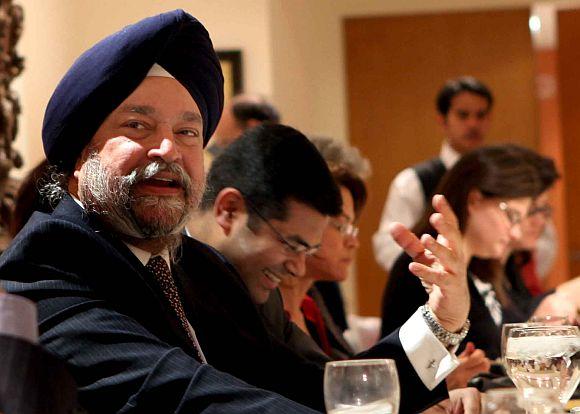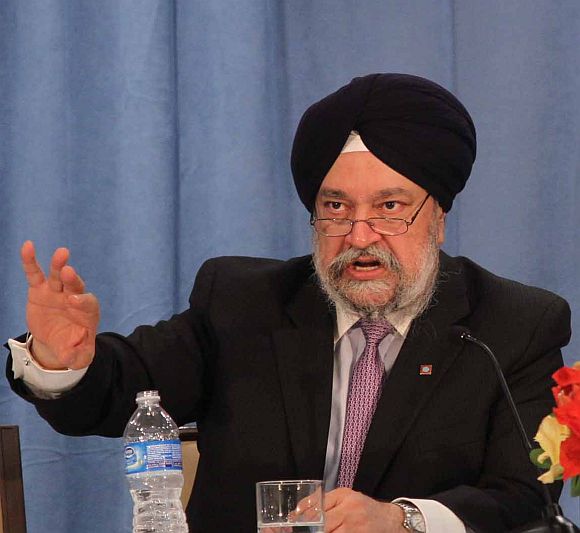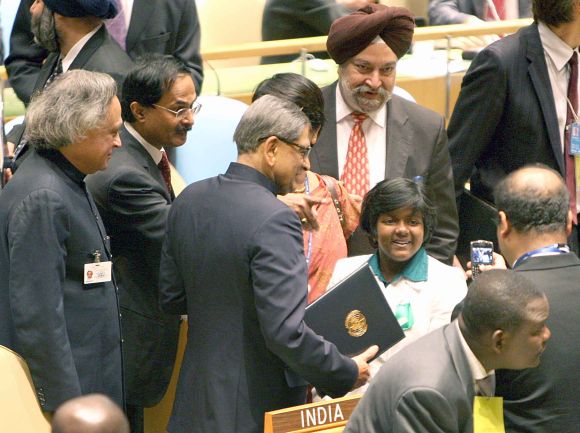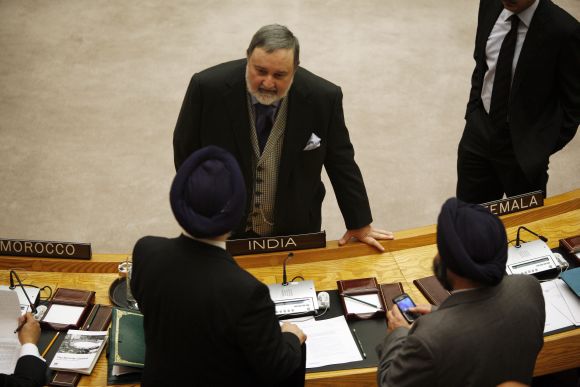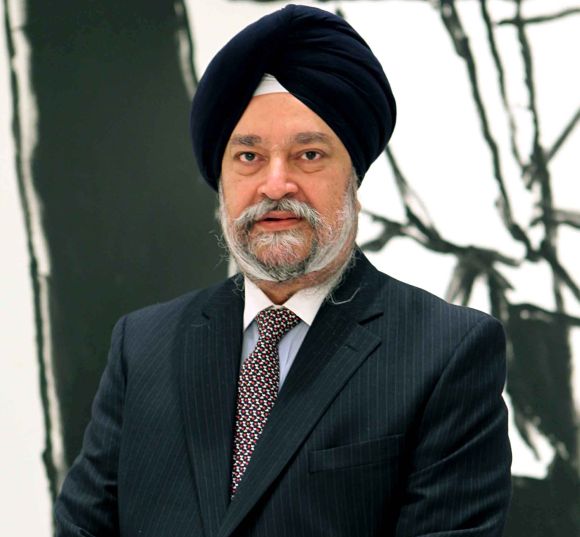 | « Back to article | Print this article |
Hardeep Puri on UN tenure: 'India a breath of fresh air'
'A lot is vested in India-US relationship and therefore it is very important that it be insulated from the zig-zags of misunderstandings, and the projection of that is very important,' recently retired India's permanent representative to the United Nations Hardeep Puri says during a meeting hosted by the Washington Indian News Group. Aziz Haniffa reports.
India's dynamic permanent representative to the United Nations, Hardeep Singh Puri, who retired last month after 39 years in diplomatic service, believes that New Delhi's relationship with the United States is the most important bilateral relationship and hence is imperative that it be insulated from any unnecessary misunderstandings.
In a candid and expansive conversation at a luncheon meeting hosted by the Washington Indian News Group, Puri said, "Whether one likes it or not, other than the immediate neighbourhood, which is Pakistan, Sri Lanka, Maldives and Nepal, no matter which way you look at it, our relationship with the United States is by far the most important bilateral relationship."
He argued that "a lot is vested in this relationship and therefore it is very important that this relationship be insulated from the zig-zags of misunderstandings, and therefore the projection of that is very important."
"That's where you guys come in," he said, saying, "The Indian press corps in the US have a much more important role to play than you perhaps sometimes realise."
Please click NEXT to read further...
'Policy-making in Delhi is facing many problems'
Never known to be one to pull his punches, Puri bemoaned that "I genuinely believe that foreign policy-making in Delhi, as indeed elsewhere, is facing many problems. One of the major problems is that we are not in a position in New Delhi, just now as I think in Washington, of being able to realise that the press has a crucial role to play in defining and building public opinion, but that governments also have to factor that in, when it comes to policy-making."
"So, sometimes, I find that even policies, which are superbly crafted in Delhi and reasonably well executed in the field wherever, that the government is not able to then reach out to its own domestic constituencies, which in the first instance means a handful of retired foreign service officers, who choose to place their own interpretations on it, resulting in all kinds of confusion."
Puri reiterated that "even policies which are superbly crafted, which have absolutely the force of reason -- rationality behind them -- people are taking pot-shots and nobody in Delhi is able to explain as to why they had that policy -- what is it? Is it diffidence? Is it because we believe in the foreign service at the highest levels that we don't take issue with the press? This is what is worrying me."
Thus, he said, "I have come to a personal conclusion that it has something to do with the nature of our society and I am being a little philosophical."
Please click NEXT to read further...
'Tendentious reporting at the heart of India's foreign policy woes'
Puri noted that "in the United States, anyone who's made money, loves to dabble in foreign policy -- everyone is a member of some think tank. But the advantage of think tanks is that there are some professional researchers. If you look at the University of Pennsylvania list of the world's 150 top think tanks, most of them are in the United States, and you find the Indian think tanks, very few qualify in the top, and for good reason.
"It's a question of financing, not having endowments and so on. But the mistake that's occurring is because we don't have professional think tanks, or the one which are there are just starting and there's no resource, most of our foreign policy commentators are relying on what I would call secondary material."
Pillorying the Indian commentators and policy wonks, Puri said, "So, most of our guys, because they are one-man armies, what they do is write three pieces a day -- not 90 a month, but 57 in a month, and they are equal experts in Central Asia, United States, China, Japan, and they churn out stuff because they read it somewhere.
"So, in other words, the first report, where we take a position on a particular vote, even if that report is faithful to the extent that it quotes me correctly, some sub-editor in Delhi gives it a slightly misleading headline, many of our foreign policy pundits will read, and on the basis of that headline will then say, the Indian foreign policy under dispensation X is pro-American -- so they have decided to go down a particular road."
Puri said, "Then the first commentator will write, and then the second and third guy has not even read the story will all follow...and then what you get is tendentious reporting."
Please click NEXT to read further...
'There was never a dull moment in UN when Indians were around'
He asserted that he was justifiably proud of his tenure and spoke of India winning every election in the UN system, most notably the unanimous vote to be elected a non-permanent member of the UN Security Council "unlike the debacle in 1995-1996, when India got thumped by Japan."
Puri said as for "our achievements, first and foremost, don't ask me -- call the Chinese, call the Russians, call the Americans, call whoever you like. Ask them how were the Indians in the Security Council? And they will tell you they were a breath of fresh air -- that they argued, they had good reasons to argue, there was never a dull moment with the Indians around, and when the Indians were around, you had to really work for your living.
"We were able to build bridges between the developed and developing countries, we were able to stand up for the interests of the developing countries, and we built a very healthy working relationship with the United States in the Council."
Puri said some of the advances India made on the issue on terrorism were unprecedented. "We were able to achieve more than we expected. We were able to get the zero tolerance concept in Security Council lexicon. A large number of terrorists of interest to India were proscribed by the Al Qaeda and the Taliban Sanctions Committee, we were able to get action on terrorist financing.
"We were also able to deal with certain other aspects of terrorism over a two-year period, which will ultimately help us as a country ....a country which is a victim of terror," he said.
Puri continued that "we ended up doing pretty good things -- on piracy, where we were able to ensure that the Security Council is looking at piracy in a comprehensive, global manner."
Please click NEXT to read further...
'India must quickly seek re-election as UNSC non-permanent member'
We were able to have a thematic debate on women, peace and development, but more important than that, whenever there was an issue of any significance, India was in demand both by Britain, France and the United States, because they would say that India's vote is very important, not because of India, (but) because if India comes, then Brazil, South Africa, Nigeria -- and others will come in."
Puri, on the question on showing that India is a responsible entity worthy of being a permanent member of the Security Council, said, "We showcased the fact that we are very responsible," but argued that this did not mean "we have to appear to be completely with convergence with the world's leading power. That did not happen."
"If the price for India's permanent membership is to say that we are a junior partner of some other big power, I am afraid it's not worth it," he asserted.
But, Puri pointed out that there was a strong consensus in support of India's permanent membership, and noted, "You get statements by the Americans, British and French (in support of India's bid) and we should welcome these statements. You get qualified statements from the Chinese, by the Russians, and we should encourage them to become more forthright."
However, he explained that "what is going to get you permanent membership is that somebody has to take the decision to put a resolution to vote, which in itself means there has to be a resolution and then you have to garner votes for it."
Puri said India, to bolster its candidacy, should also quickly seek re-election as a non-permanent member of the Security Council once again, and said he had strongly recommended to New Delhi that India once again throws its hat in the ring.
TOP photo features of the week
Click on MORE to see another set of PHOTO features...
